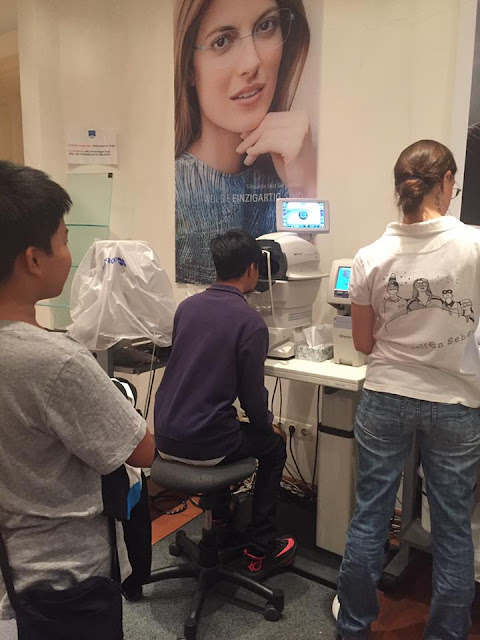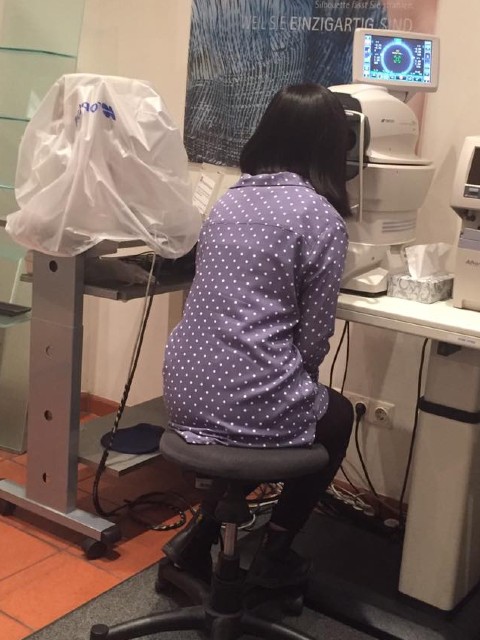
Will Not Wearing Glasses Worsen Eyesight? – one of the many fittings we had to go to
It has been 5 years now when two of our kids (dear daughter and youngest) first wore their eyeglasses. We would then visit their ophthalmologist yearly for a check up. Sometime within those visits, our middle kid also has to wear a pair.
Eyeglasses (spectacles) and corrective lenses have not only been helpful for making the wearer see clearly, it will also remove symptoms of having bad vision. Of course, one has to adjust wearing them, and it may be uncomfortable at first, but as your vision adjusts and eye strain lessens, it gets better. Others choose to wear contact lenses, which requires more care so as not to irritate the eyes.
Regardless, we are advised to rest our eyes from wearing them. But what really happens when one chooses not to put their specs on? Will not wearing eyeglasses worsen eyesight?
Table of Contents
What is Bad Vision?
Visual impairment, bad vision, or vision impairment, the decreases ability to see, which to a degree can be fixed. Vision loss, however, is not fixable by usual methods such as eyeglasses. The most common causes that could be fixed by correction glasses are refractive errors, that is, the inability to focus light accurately on the retina because of the cornea’s shape. Here are 5 fixable conditions:
Nearsightedness / myopia: Close objects are clear, far objects look blurry.
Farsightedness / hyperopia: Far objects clear, close objects look blurry.
Astigmatism: Blurred vision at all distances, caused by an imperfection in the curvature of the eye.
Presbyopia: Happens when the eyes lose the ability to focus on nearby objects due to aging.
Lazy eye / amblyopia: This happens when only one eye focuses properly, getting the brain to rely on that stronger eye while the lazy eye gets ignored.
There are a handful more eye disorders and diseases caused by other factors, read more about them here.

Will Not Wearing Glasses Worsen Eyesight? – first pair when he was 7
How do Glasses and Corrective Lenses Help?
As mentioned above, one cause of vision impairment is refractive error, the inability for light to focus properly on the retina because of misshaped cornea. The retina is located at the back of the eye and near the optic nerve. Refraction is the process of how the brain creates the images we see – the eyes’ lenses sends light to the retina then converts the light into signals and then sends them to the brain. If there is refractive error, eyeglasses help focus the light appropriately on the retina.
Which type of eyeglasses will improve each condition:
Nearsightedness: Concave lens (curved inward).
Farsightedness: Convex lens (curved outward).
Astigmatism: Cylinder-shaped lens.
Presbyopia: Bifocal (two different lenses in a single pair of glasses) or multifocal lenses (also called progressive lenses have multiple focusing capacities that improves vision at different distances).
Lazy eye : Depending on the eye condition, the lenses could be different. Wearing eyeglasses, and training the brain to use the eyes equally will correct this problem in time. One such method is by wearing a patch on the stronger eye, and then using eye drops.
Will Not Wearing Glasses Worsen Eyesight?
Simply put: no. Not wearing glasses or corrective lenses will not worsen one’s vision, but there will be discomfort brought about by bad vision. Some of these symptoms are eye strain headache, dizziness, squinting, and eye pain.
Spectacles and lenses make up for the lack of light focus that makes the eye/s work harder. Wearing them removes the strain in the eyes and in effect the symptoms. So it’s normal for some or any of the symptoms to be felt when the glasses are removed for long.
When you don’t wear your eyeglasses, your vision reverts to normal (unfortunately, impaired vision). This may hinder you to function as you normally would with your glasses on. Symptoms may lead to: accidents and injuries, not being able to concentrate, irritability, and in some cases may also escalate to chronic eye disease and/or blindness.
 Will Not Wearing Glasses Worsen Eyesight? : no glasses |
 Will Not Wearing Glasses Worsen Eyesight? : glasses on |
Wearing Glasses Does Improve Vision
If you notice that you still experience headaches when wearing your pair of glasses, chances are you were not given the correct prescription.
You will easily notice how your vision clears once you put your specs on, and how it goes fuzzy when you remove them. Yes, wearing glasses improve your vision when you wear them. This doesn’t alter your eye, but just removes eye strain.
Eye Care
We’ve yet to have eyeglasses that will restore 20/20 vision. For now, laser surgery is an option to correct the shape of the cornea to improve eyesight.
– However, as most of our health improve in relation to food, having foods rich in antioxidants can improve ocular health. Some you should incorporate in your diet include eggs, broccoli, red berries, avocado, salmon, red meat, and poultry.
– We do know that reading a favorite book over and over again is a good thing but rest is also important. The eyes get tired too, so make sure you have a bookmarker, rest your eyes for a few minutes before finishing your favorite book.
– Less eye strain means giving your eyes the rest they needed. This is especially helpful to those working on long hours in front of computer monitors.
– Sleep, the best way to heal from any ailment, is your best shot to give your eyes the best care they need.
– Also, don’t forget to have your regular visit to your ophthalmologist. Once you notice a difference in your vision, have your eyes checked immediately.
 Will Not Wearing Glasses Worsen Eyesight? : check up |
 Will Not Wearing Glasses Worsen Eyesight? : yearly check |





I agree, wearing eyeglasses does make my headache go away….so I try to put it on as much as I can (but only reading glasses when finishing books) 🙂